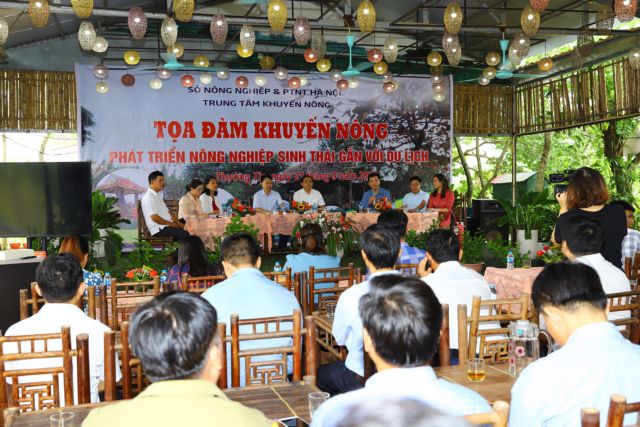 Society
Society


|
| The Hà Nội Agricultural Promotion Centre organises a seminar on developing ecological agriculture and tourism in Hồng Vân Commune, Thường Tín District in Hà Nội. Photo courtesy of the city’s Department of Agriculture and Rural Development |
HÀ NỘI – In recent years, Hà Nội has been exploring the potential of ecological agriculture, alongside culture and traditional craft villages, in order to develop a fresh agricultural tourism model that offers captivating experiences for visitors.
The capital city has witnessed the establishment and development of numerous ecological agricultural models, resulting in positive outcomes.
Vũ Thị Hương, Director of Hà Nội Agricultural Promotion Centre, said that the development of ecological agriculture was a crucial premise for building liveable rural areas. In addition to improving the livelihoods and quality of life for rural residents, agricultural development in suburban areas also played a vital role as the 'green lungs' for the inner city.
Currently, there are 11 ecological farms operating under the educational and experiential tourism model and four agricultural cooperatives utilising the rural farm model in Sóc Sơn, Ba Vì, Thanh Trì, Gia Lâm and Thường Tín districts.
Located in Thường Tín District, Hồng Vân Commune has developed as an ecological village combined with eco-tourism services. The commune attracts nearly 60,000 visitors each year, generating an estimated income of more than VNĐ6 billion annually.
In 2018, the city’s authority recognised the commune as an ecological craft village tourism destination. This milestone was important for the local government and residents to continue promoting the development of ecological agriculture in conjunction with building a new rural area.
The commune aimed to become a central hub connecting key regions and an attractive tourist destination in the capital city by 2025.
Vĩnh Ngọc Commune in Đông Anh District has been known as a successful model for organic grape cultivation combined with eco-tourism. Leveraging advantages in agriculture, transportation, and tourism, Vĩnh Ngọc Commune has established a professional grape cultivation association consisting of five members covering nearly five hectares of land. Visitors can experience the stages of grape planting, tending, and harvesting.
With two harvests per year, the estimated grape production is expected to reach 50 to 60 tonnes annually, with a selling price of VNĐ200,000 per kilogram, bringing significant income to farmers.
This model has promoted agricultural development, increased farmers' income, and created ecological spaces in urban areas.
Previously, the residents of Phù Đổng Commune in Gia Lâm District mainly engaged in dairy cattle farming, but due to unstable income, they have switched to flower and ornamental plant production.
The commune developed a large area of paperflower (bougainvillea glabra) plants. This transition, combined with income from visitors who came to visit and take photos in the flower gardens, has resulted in an annual income of over VNĐ780 million per hectare per year.
In 2020, the municipal People's Committee recognised the commune as Phù Đổng Paperflower Craft Village.
Nguyễn Kim Loan, vice chairwoman of the People's Committee of Thạch Thất District said the committee would enhance skills to better serve visitors and establish multiple places to promote locally distinctive products under the "One Commune, One Product" (OCOP) programme and improve the value of ecological agricultural and local craft products.
Tạ Văn Tường, deputy director of the city’s Department of Agriculture and Rural Development stated that Hà Nội is focusing on the pilot development of six ecological agriculture models with a sustainable and responsible approach to green tourism in Thường Tín, Đan Phượng, Thanh Trì, Mỹ Đức, Thạch Thất, and Sơn Tây Town.
Localities needed to establish specialised models for cultivating crops and raising livestock, such as flowers and ornamental plants, fruits and vegetables, food crops, livestock farming, and poultry farming. These models aimed to meet the consumption demands of visitors and attract them to eco-agricultural models, thereby increasing income for farmers, he said.
Dr Đinh Phạm Hiền from the Ministry of Agriculture and Rural Development’s International Cooperation Department said Hà Nội should identify its distinctive agricultural products to attract visitors.
He suggested the city promote the application of technology in ecological agricultural production to improve product quality. Currently, Hà Nội has 164 high-tech application models, which provide favourable conditions for localities to develop ecological agriculture with high economic efficiency.
Hiền suggested functional departments support farmers in scientific and safe production techniques; provide training sessions to enhance communication skills with visitors for farmers; investing in supporting infrastructure at ecological agricultural sites; and connect with businesses to attract visitors for experiential tours combined with shopping at ecological agricultural sites.
Nguyễn Mạnh Quyền, vice chairman of the Hà Nội’s People's Committee said the city has launched the plan for the development of agricultural tourism and rural areas linked to the construction of new rural areas in Hà Nội in the period of 2021-2025.
The city would take various measures to attract business to invest in this sector and support the training of human resources. This would create conditions for the development of rural tourism in alignment with the progress of enhancing new rural areas, he added. – VNS




